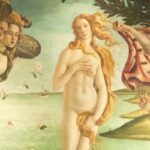We explain what Greek culture is, its history and geographical location. Also, its characteristics and its relationship with Roman culture.
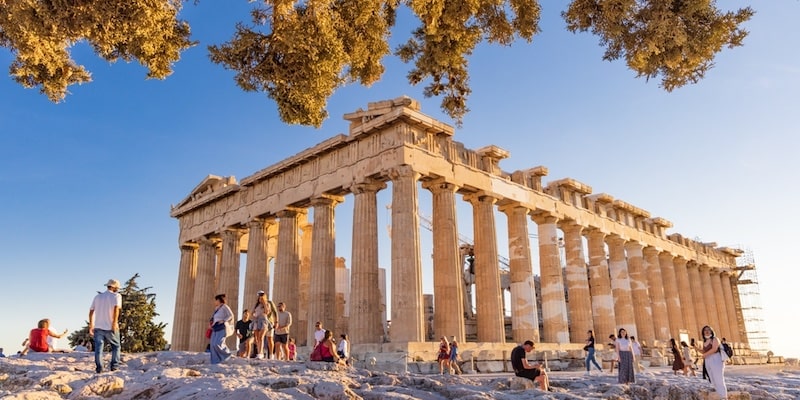
What is Greek culture?
The term “Greek culture” is used to identify the civilization that inhabited Greece in ancient times. It is one of the most important ancient civilizations, due to its influence on other societies contemporary to it and on later Western society.
Greek culture It inhabited southeastern Europe and the islands of the eastern Mediterranean around the 12th century BC. c There it took cultural traits from the ancient Minoan and Mycenaean civilizations. It spread along the coast of Asia Minor and later across other islands in the western Mediterranean, until it was conquered by the Romans in the 2nd century BC. c.
During the classical era (6th and 5th centuries BC), the major Greek city-states (such as Athens, Corinth, Thebes, Sparta, and Miletus) encouraged the development of art, architecture and literature. The constructions of large temples date from this era, such as the Parthenon, dedicated to the goddess Athena, and the Hephaestion in Athens.
At the same time, the growth of specialized studies spurred a breakthrough in philosophy, natural sciences and mathematics. In this sense, the philosophical works of Plato and Aristotle, and the medical studies of Hippocrates, stand out.
This cultural development became one of the main bases of later European culture along with the Roman culture that developed a few centuries later. In the 16th century, during the Renaissance, European artists and scholars revalued the styles and works of Greek culture.
History of Greek culture
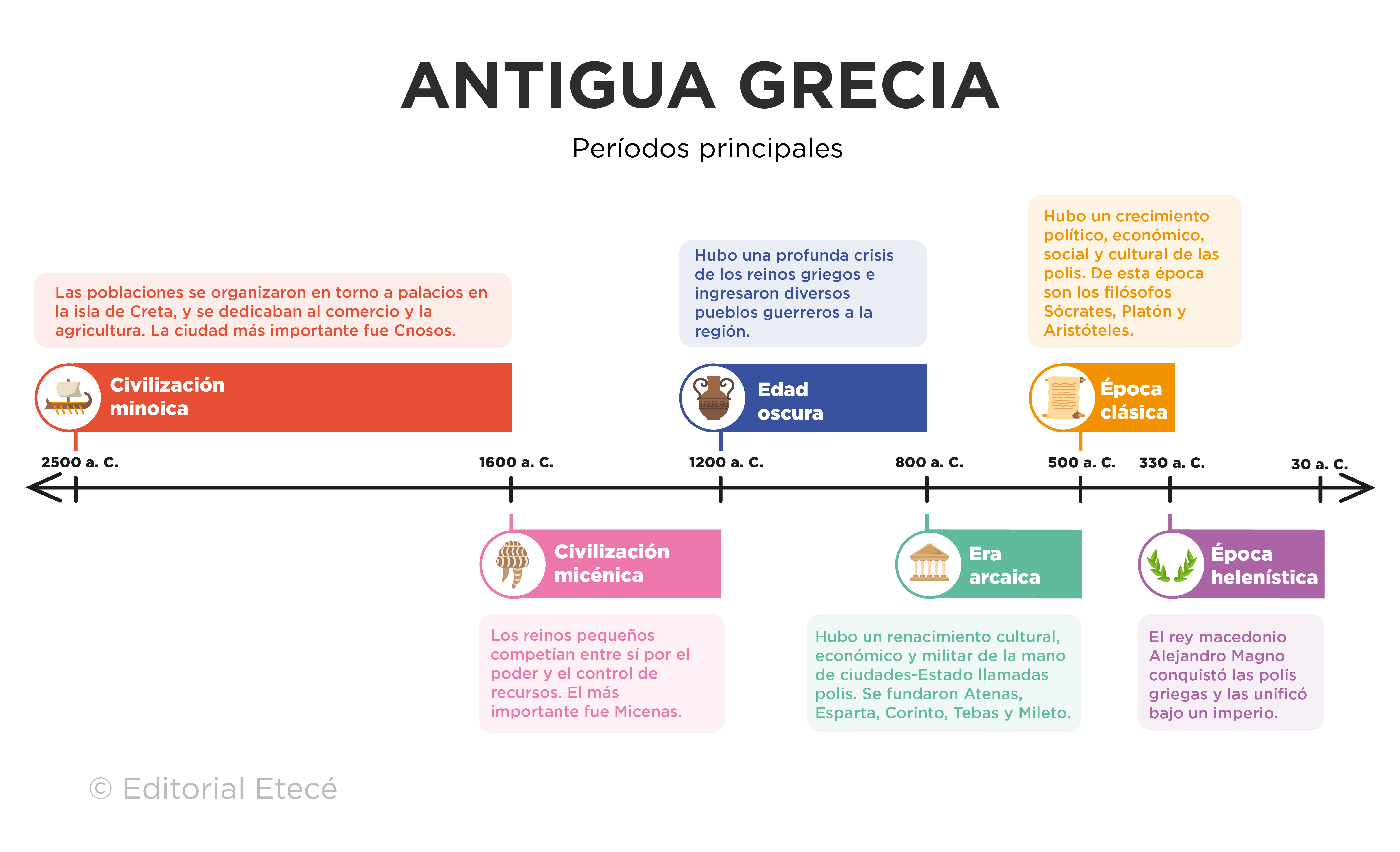
The history of Greek culture can be divided into the following stages:
Minoan civilization (2500-1600 BC)
This civilization was made up of different populations organized around palaces and urban centers on the island of Crete.
They were peaceful populations that were not dedicated to war. Their palaces were decorated with images of landscapes and animals. They worshiped various male and female deities, among which a bull god (Minos) stood out. They developed two types of writing, one pictorial and the other syllabic.
Mycenaean civilization (1600-1200 BC)
During this stage, there were various small kingdoms that competed with each other for power and control of resources. The most important was Mycenae, on the Peloponnese peninsula.
The Mycenaean religion was polytheistic, it had different anthropomorphic gods (with animal and human forms). The pantheon of Olympus and the gods Zeus, Hermes, Ares, Athena, Dionysus and Artemis come from this stage of Greek history.
Dark Ages (1200-800 BC)
During this period, the Greek kingdoms went through a deep crisis, great material poverty and the fall of palaces and urban centers. Furthermore, various warrior peoples entered the region and writing disappeared.
The most important cultural characteristic of this period was the dissemination of heroic poems orally by aedos (singing poets). The Homeric poems of the Iliad and the Odysseywhich were transcribed in the 8th century BC. c.
Archaic era (800-500 BC)
This period was characterized by the cultural, economic and military development of small independent city-states called polis.
Each polis had its own political and social organization, and constituted the homeland of each Greek. However, all the Greek polis recognized a common cultural identity characterized by the use of the Greek language, the common pantheon of divinities and certain uses and customs of daily life.
Classical period (500-330 BC)
During the classical era, the Greek polis experienced a period of material expansion and cultural splendor. The different branches of arts and knowledge grew.
Most of the Greek authors who influenced later Western culture date from this time. Among them, the philosophers Plato and Aristotle stand out; the works of Anaxagoras, Parmenides and Empedocles on different areas of nature; Alcmeon and Hippocrates in medicine and Euclid in geometry.
Hellenistic era (330-30 BC)
In this period, the Macedonian king Alexander the Great conquered the different Greek polis and unified them under a great empire that extended in all directions. Through different institutions, Alexander's empire spread various aspects of Greek culture to the East.
Hellenistic culture was characterized by the combination of Greek culture with that of the different eastern peoples conquered under the Alexandrian Empire.
Geographic location of Greek culture
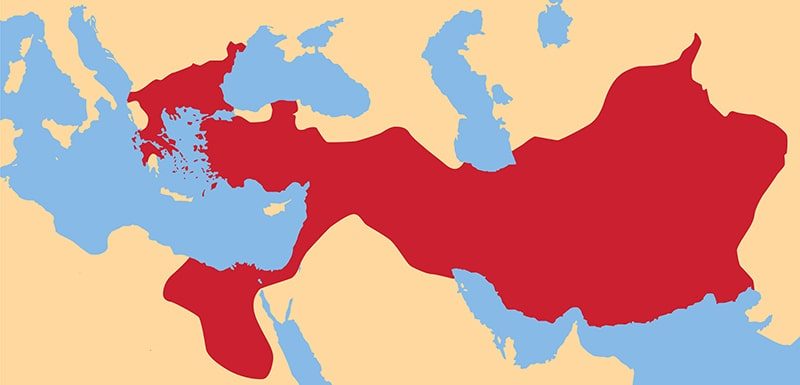
The culture of Ancient Greece arose south of the Balkans, in the eastern Mediterranean. At its peak, it occupied the entire Greek peninsula up to the coasts of modern-day Macedonia, Türkiye and Italy.
The Greek civilization also founded populations along the European Mediterranean coast, in current territory of Spain and France, as well as on the coast of current Egypt.
During the Hellenistic period, under the leadership of the conqueror Alexander the Great, Greece (then called the Macedonian Empire) annexed the territories of present-day Turkey, Egypt, part of Libya, Syria, Jordan, Palestine, Israel, Armenia and ancient Mesopotamia.
At its greatest expansion, the Hellenistic Empire also included part of the current territories of Iraq, Iran, Kuwait, Afghanistan, Pakistan, Uzbekistan and Turkmenistan.
Characteristics of Greek culture

Among the main characteristics of Greek culture are the political organization in polis, religious polytheism, the development of philosophy, the study of nature and other branches of knowledge of the world; the search for beauty in art and the richness of literary and theatrical works.
In summary, the culture of Ancient Greece was characterized by:
The cops
During the classical period, the Greeks were organized into independent city-states, called polis. Each polis was a different political unit that had a main urban center and surrounding lands. All Greeks identified the Hellenic culture that united them, but they considered their homeland to be their polis. The most important polis of this period were Athens, Sparta, Miletus, Corinth and Thebes.
religious polytheism
The Greeks believed in different divinities that they represented in human form. They maintained that the gods were immortal, but they attributed the virtues and defects of mortals to them: they were guided by feelings such as love and hate. According to popular belief, the gods lived on Mount Olympus and watched over the behavior of mortals.
The development of philosophy
During the classical period, the Greeks developed the study of philosophy to understand different mysteries of life such as the origin of natural phenomena or the nature of the human body and the Earth. Some philosophers wondered about the origin of things, such as Thales of Miletus or Heraclitus. Others reflected on the forms of political and social organization, such as Plato or Aristotle.
The search for beauty in art
Greek artists sought to represent human beings in an ideal form. During the classical era, the parameter of beauty was crossed by the notions of balance, proportion and harmony. In architecture, the construction of large marble temples painted with bright colors stood out. In sculpture, artists exalted the human body, especially the male.
Literary and theatrical works
The main written genres of Greek culture were epic poetry, lyric poetry and theater. Many of these works told the stories of great mythical heroes who defied the will of the gods or real characters of the time who went through comic situations. Among the most notable authors are Pindar (lyric poetry), Aristophanes (theatrical comedies), Aeschylus, Sophocles and Euripides (tragic plays).
Contributions of Greek culture
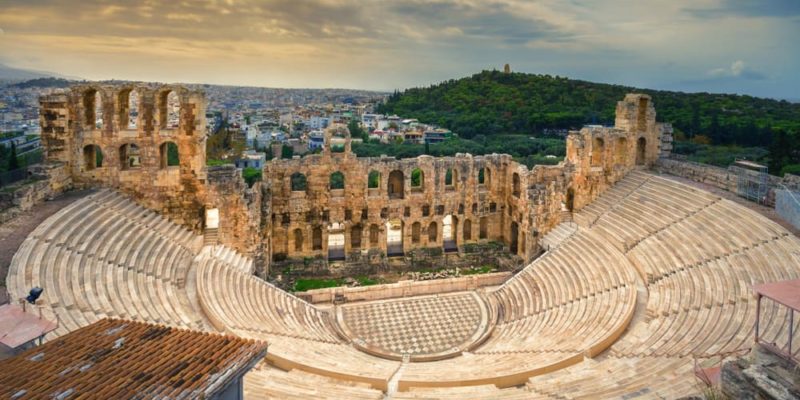
The great development of studies, thoughts, works and constructions of Greek culture over the centuries left a series of elements that influenced the development of subsequent Western culture. Among them, we can highlight:
The invention of democracy
Towards the end of the 6th century BC. C., the society of Athens went through a series of political and social transformations that gave rise to a new form of government unknown until then, called democracy.
This system granted for the first time equal political rights to all citizens. At that time, only males over 21 years of age with an Athenian father and mother were considered citizens. However, this was the first experience of a political and social organization based on popular political participation through suffrage.
The Olympic Games
The different Greek polis faced each other in sporting festivities held in honor of the gods of Olympus. These games were held every four years, and specialists believe that they began to take place around the 16th century BC. C. During the celebration of the Olympic Games, the polis accepted a sacred truce that prohibited the practice of war or any military attack.
The creation of philosophy
The Greeks they created philosophical studies. Among its main authors were Thales of Miletus, Socrates, Plato, Aristotle, Heraclitus, Democritus and Parmenides. These philosophers laid the foundations of rational thought and raised some of the fundamental questions about the universe, nature, man and society. Through their works, they shaped a worldview that influenced European thought and on which the main branches of later science were developed.
The artistic legacy
The Greeks developed different artistic traditions of which the work of authors such as Homer (author of the Iliad and the Odyssey), Aesop (author of numerous fables), Aristophanes (author of comedies), Sophocles, Aeschylus and Euripides (playwrights). Herodotus (geographer and historian) and Hesiod (poet and philosopher) also stand out.
Greco-Roman culture
Between the 4th and 1st centuries BC. C., The Roman Republic carried out a process of expansion through the conquest of the different peoples of the Mediterranean region. During this period, the Romans came into contact with different cultures that they were unaware of and that generated changes in their customs and values.
The greatest cultural influence that Roman society received was that of Greek culture. In the second century BC. C., the Romans conquered the Hellenistic kingdoms (Macedonia, Greece and Pergamum) and took the works of art, jewels and different material goods and took them as spoils of war to Rome.
In this context, the Romans also brought Greek intellectuals, philosophers, thinkers and scholars to Rome. Some of them were employed as teachers of the young men of Roman aristocratic families, others as bureaucratic assistants.
So, a process of Hellenization of Roman culture began. Wealthy families learned the history and customs of classical Greece. Furthermore, the cult of the gods of Olympus spread, who were assimilated to local divinities and linked to the stories of the Roman pantheon.
This Greco-Roman cultural tradition was established centuries later as one of the main elements of Western European culture.
References
- Hornblower, S. (2022). Ancient Greek civilization. Encyclopedia Britannica. https://www.britannica.com/
- Pollard, J., Thornhill, R., & Adkins, A. (2022). Greek religion. Encyclopedia Britannica. https://www.britannica.com/
- Pomeroy, S., Burstein, S., Donlan, W., & Tolbert, J. (2001). Ancient Greece. Political, social and cultural history. Criticism.




